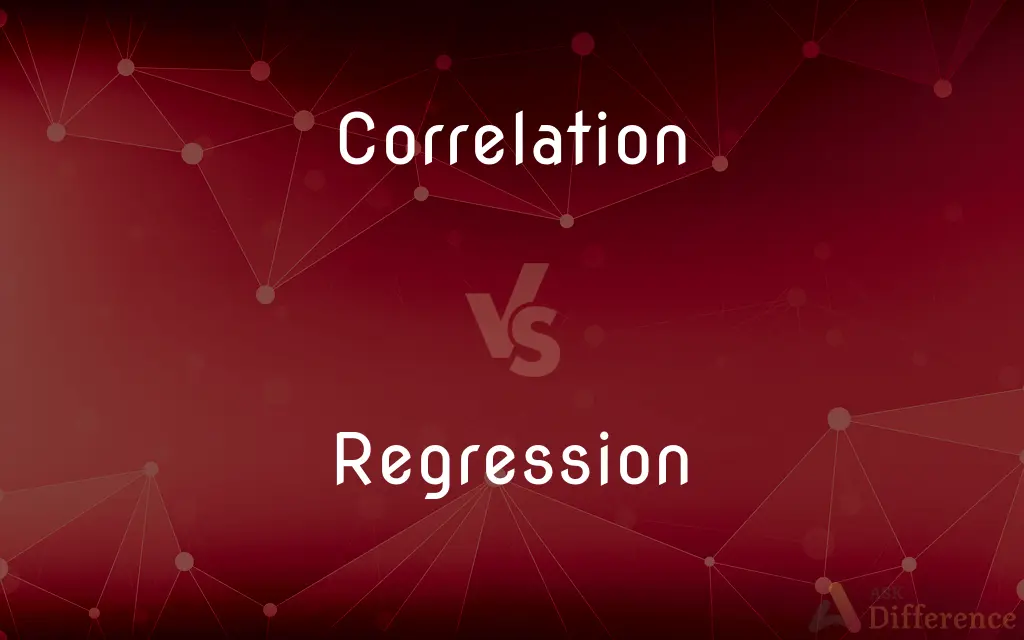Correlation vs. Regression — What's the Difference?

Difference Between Correlation and Regression
ADVERTISEMENT
Compare with Definitions
Correlation
In statistics, correlation or dependence is any statistical relationship, whether causal or not, between two random variables or bivariate data. In the broadest sense correlation is any statistical association, though it commonly refers to the degree to which a pair of variables are linearly related.
Regression
The process or an instance of regressing, as to a less perfect or less developed state.
Correlation
A relationship or connection between two things based on co-occurrence or pattern of change
A correlation between drug abuse and crime.
Regression
(Psychology) In psychoanalytic theory, reversion to an earlier or less mature stage of psychological development.
Correlation
(Statistics) The tendency for two values or variables to change together, in either the same or opposite way
As cigarette smoking increases, so does the incidence of lung cancer, indicating a positive correlation.
ADVERTISEMENT
Regression
(Medicine) Subsidence of the symptoms or process of a disease.
Correlation
An act of correlating or the condition of being correlated.
Regression
(Statistics) A technique for predicting the value of a dependent variable as a function of one or more independent variables in the presence of random error.
Correlation
A reciprocal, parallel or complementary relationship between two or more comparable objects.
Regression
(Astronomy) Retrograde motion of a celestial body.
Correlation
(statistics) One of the several measures of the linear statistical relationship between two random variables, indicating both the strength and direction of the relationship.
Regression
(Geology) A relative fall in sea level resulting in deposition of terrestrial strata over marine strata.
Correlation
(algebra) An isomorphism from a projective space to the dual of a projective space, often to the dual of itself.
Regression
An action of regressing, a return to a previous state.
Correlation
Reciprocal relation; corresponding similarity or parallelism of relation or law; capacity of being converted into, or of giving place to, one another, under certain conditions; as, the correlation of forces, or of zymotic diseases.
Regression
An action of travelling mentally back in time.
Correlation
A reciprocal relation between two or more things
Regression
(psychotherapy) A psychotherapeutic method whereby healing is facilitated by inducing the patient to act out behaviour typical of an earlier developmental stage.
Correlation
A statistic representing how closely two variables co-vary; it can vary from -1 (perfect negative correlation) through 0 (no correlation) to +1 (perfect positive correlation);
What is the correlation between those two variables?
Regression
(statistics) An analytic method to measure the association of one or more independent variables with a dependent variable.
Correlation
A statistical relation between two or more variables such that systematic changes in the value of one variable are accompanied by systematic changes in the other
Regression
(statistics) An equation using specified and associated data for two or more variables such that one variable can be estimated from the remaining variable(s). Category:en:Functions
Regression
(programming) The reappearance of a bug in a piece of software that had previously been fixed.
Regression
(medicine) The diminishing of a cellular mass like a tumor, or of an organ size.
Regression
(exercise) The making an exercise less straining to perform by manipulating the details of its performance like loaded weight, range of motion, angle, speed.
Regression
The act of passing back or returning; retrogression; retrogradation.
Regression
An abnormal state in which development has stopped prematurely
Regression
(psychiatry) a defense mechanism in which you flee from reality by assuming a more infantile state
Regression
The relation between selected values of x and observed values of y (from which the most probable value of y can be predicted for any value of x)
Regression
Returning to a former state
Share Your Discovery

Previous Comparison
Mamaw vs. Meemaw
Next Comparison
Likes vs. Like













































